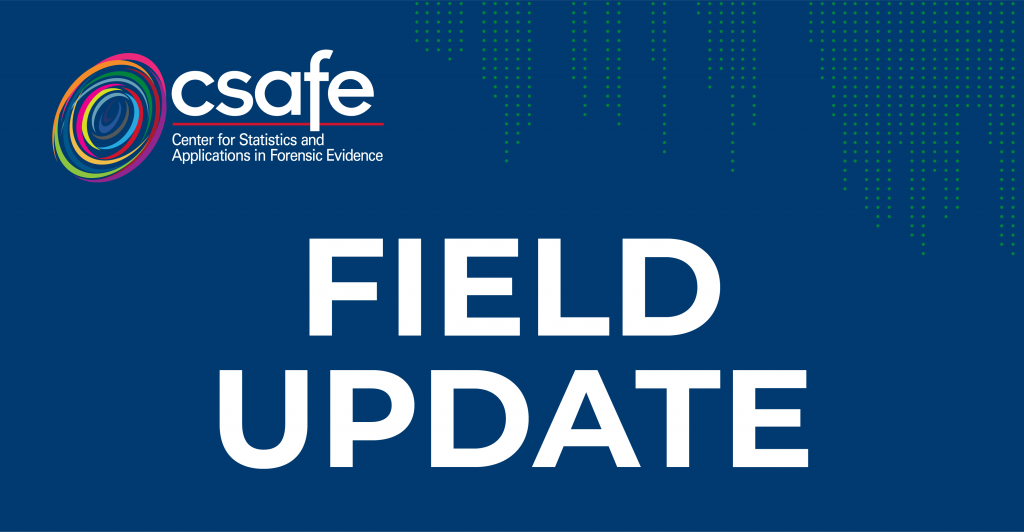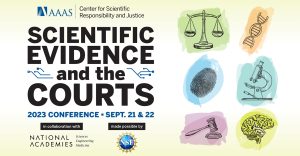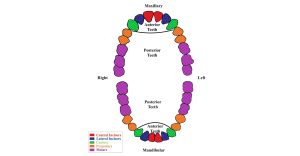The Center for Statistics and Applications in Forensic Evidence (CSAFE) hosted its annual Field Update on June 14. More than 220 researchers, forensic science practitioners, members of the legal community and others attended the live webcast that focused on the latest advancements in CSAFE research.
During the Field Update, CSAFE researchers provided insights from their top publications from the past year and a preview of the research CSAFE teams are beginning to work on for the upcoming year. In addition, CSAFE presented a special session on applying algorithms to forensic science analysis and the ethical implications to consider.
The presentation recordings and slides are available at https://forensicstats.org/blog/portfolio/2021-field-update/.
Session 1: Insights from the Inside
In the first session, researchers presented insights from the top CSAFE publications from the past year, providing an overview, forensic science applications and future directions. Topics covered a range of CSAFE research areas and forensic science disciplines, from handwriting analysis to firearms and toolmarks to digital evidence. Each presentation was 25 minutes.
There were nine presentations in the first session:
Implementing Blind Proficiency Testing in Forensic Laboratories: Motivation, Obstacles, and Recommendations
Robin Mejia, Carnegie Mellon University
Judges and Forensic Science Education: A National Survey
Brandon Garrett, Duke University
Everest—We are Going to Lose Many: A Survey of Fingerprint Examiners’ Attitudes Towards Probabilistic Reporting
Simon Cole, University of California, Irvine
Treatment of Inconclusive Results in Error Rates of Firearms Studies
Heike Hofmann, Iowa State University
A Field Analysis of Laboratory Case Processing: Print Comparison and Examiner Conclusions
Brett Gardner, University of Virginia, and Maddisen Neuman, Houston Forensic Science Center
Psychometric Analysis of Forensic Examiner Behavior
Amanda Luby, Swarthmore College
A Clustering Method for Graphical Handwriting Components and Statistical Writership Analysis
Alicia Carriquiry, Iowa State University
EviHunter: An Android Application Forensic Artifacts Database
Yong Guan, Iowa State University
Statistical Methods for the Forensic Analysis of Geolocated Event Data
Padhraic Smyth, University of California, Irvine
Session 2: What’s Next at CSAFE
In the second session, CSAFE researchers shared the new projects they are currently working on. Each 25-minute presentation gave a broad overview of the project’s direction, preliminary results and work that has already been accomplished and what they will work on this year. There were four presentations in this session:
Evaluating Foundational Validity of Toolmark Analysis
Maria Cuellar, University of Pennsylvania
Subclass Characterization and Analysis of Firearms
Keith Morris, West Virginia University
Statistical Methods for Bloodstain Pattern Analysis
Hal Stern, University of California, Irvine
Statistical Models for the Generation and Interpretation of Footwear Impression Evidence
Charless Fowlkes, University of California, Irvine
Session 3: Applying Algorithms to Forensic Science Analysis
The last session was a two-part session where attendees learned how algorithms are becoming a helpful tool and critical considerations for their implementation. Separate panels delivered each section and were available for discussion immediately following their respective presentations.
In part one, Jeff Salyards, research scientist at CSAFE, discussed algorithmic approaches currently being implemented in forensic science labs and disciplines. Presentations were also made by Alicia Carriquiry, director of CSAFE and Distinguished Professor and President’s Chair in Statistics at Iowa State University; and Hal Stern, co-director of CSAFE and Provost and Executive Vice Chancellor and Chancellor’s Professor of Statistics at the University of California, Irvine.
Part two of the session was presented by CSAFE co-director Karen Kafadar, professor and chair of statistics at University of Virginia, and Sarah Chu, senior advisor on forensic science policy at the Innocence Project and CSAFE collaborator. Their presentations had the attendees consider the ethical implications of algorithms and when they should or should not be explored as an option.




